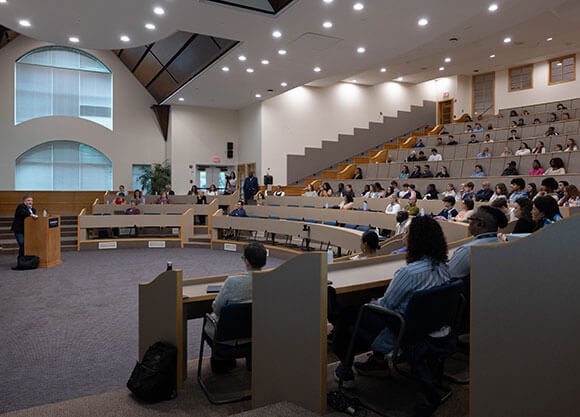
Prominent author urges university community to make a positive impact in our world
October 02, 2024

October 02, 2024

By joining Wise in his examination of the various policies, practices and procedures that exist within educational, employment and organizational settings which often inadvertently perpetuate unequal opportunity and treatment, “… we together can begin to develop strategies for shifting our institutional culture in the direction of greater parity,” said Interim Vice President for Equity and Inclusion David Fryson.
Director of Inclusive Excellence Claude Mayo welcomed Wise and the large Quinnipiac audience of students, faculty and staff to the first Critical Conversation of the new academic year.
“This series will be bringing prominent speakers to you to engage us in the issues that we know are important for our campus, for our community, and this world,” said Mayo.
Author of nine books, including the highly acclaimed memoir, “White Like Me: Reflections on Race from a Privileged Son,” Wise, a Tennessee resident, visited the Mount Carmel Campus on September 26.
For the past 25 years, Wise has spoken on more than 1,500 college and high school campuses, at hundreds of professional and academic conferences, and to dozens of corporate, government, entertainment, media, law enforcement, military, nonprofit and medical industry professionals about issues of systemic racism and methods for dismantling racial inequity in their institutions.
Wise applauded Quinnipiac for fostering the Critical Conversations Series, which promotes inclusivity of thought, respectful dialogue, empathetic engagement and open-mindedness among students, faculty and staff.
“The fact that you all are not intimidated, and not afraid to have these conversations reflects well on you, and it’s good to be able to be heard and to have a conversation in a place that still wants to have it,” said Wise.
He said there are some white people who may feel a conversation about systemic racism and injustice is somehow an attack on them as ‘white people, rather than what it actually is — an attack on a system of racial inequality known as white supremacy.
“That nuance, that ability to have a conversation about systems versus people – good over here, and bad over here — apparently eludes a lot of folks in this country, and so they’d rather not have the conversations at all,” Wise said.
He said those benefiting from the way this country and culture has been shaped have the responsibility to act to change the system of inequities which they’ve inherited.
“It isn’t about guilt; it isn’t about what you did. It’s about where you are. And if we don’t take responsibility for the world as we find it, it doesn’t change,” Wise said. “We have to recognize that we’ve all been conditioned by that society, not only in terms of our own thinking about one another, but in thinking about the society itself.”
Wise said the steps toward meeting the moment to bring change must include acknowledging inequities; recognizing other people’s truths; and acknowledging the deep and profound interest convergence that exists between white people and people of color in this country.
Too often, the implementation of actions which seek to create equity and inclusion are viewed as a zero-sum issue, Wise said.
“It’s one of the reasons we have such a problem right now, because people think of it as zero-sum, as in, ‘…if we have more equity and inclusion, that means less for me,’” said Wise. “It’s not an injustice when you have to learn to exist in a pluralistic setting; but we think of it as zero-sum because we stop there –in the short term. Yes, mathematically, if everybody gets to compete for stuff, the people that used to get 85% or 90% aren’t getting that anymore. But the question is, are there other social benefits that come from that greater equity which more than compensate for whatever short-term hardship there is? The answer to that is, ‘yes.’”
Quinnipiac Today is your source for what's happening throughout #BobcatNation. Sign up for our weekly email newsletter to be among the first to know about news, events and members of our Bobcat family who are making a positive difference in our world.
Sign Up Now